
Myat Soe
Commentary (Mizzima)
Monday, 25 August 2008 18:03
In 2001, the UN Human Rights Rapporteur, Paulo Sergio Pinheiro, asked ASEAN and the UN to help promote an all inclusive, accountable, transparent and democratic transition in Burma. When the United Nations Security Council held an informal briefing on the situation in Burma for the first time, in December 2006, delegates again urged Burmese authorities to resume dialogue with representatives from all ethnic and political opposition parties in Burma. And after the Saffron Revolution last fall it became even more urgent to hold a political dialogue between the military, pro-democracy forces and the ethnic leaders in Burma.
However, to this date, Burma's authoritarian regime justifies its hold on absolute power by declaring their political opponents as enemies of the state. The Burmese army is determined to remain strong; believing any weakness within the military will create opportunities for ethnic rebellion and secession – even though there is little evidence to suggest that most of Burma's minorities are trying to break away from the state.
Now, Burma has reached a point where international involvement is greatly needed to achieve peace in the country. The military is struggling under the burden of an over-extended army and is failing the economy. The time is now ripe for a stronger and more effective international diplomatic intervention.
The United Nations and its envoys have been busy since the Burmese government began cracking down on peaceful demonstrators after the Saffron uprising. But almost a year later, the military continues its oppressive rule, and instead of getting better, the lives of Burmese people have become worse under increased government abuses and deteriorating living conditions.
Protest leaders and monks from the recent mass demonstrations, including Su Su Nway and Ashin Gambira, were imprisoned even while Pinheiro was in Burma. The United Nations has responded to Burma's crisis by issuing press statements of regret and sorrow at the continuing large scale violent oppression inside the country.
After fourteen years, the junta persists in pushing through its seven-step roadmap to democracy, which, according to student leader Min Ko Naing, will give members of the military an unfair advantage over ordinary citizens in the quest of political power; and without a free and fair political system to guarantee peace and prosperity, Burma's legacy of violence and bloodshed will continue.
After the Saffron Revolution last September, and in spite of the efforts by the UN Secretary General and his Envoy, the Burmese regime not only refused to meet with political opposition and the ethnic leaders but instead continued imprisoning revered monks, 88 generation student leaders, NLD leaders – including both U Tin Oo and Aung San Suu Kyi – and ethnic leaders like Khun Htun Oo.
Michael Vatikiotis, a regional representative of the Henry Dunant Center for Humanitarian Dialogue, said that the recent constitutional referendum in Burma is more bad news for the international community's determined effort to encourage a peaceful political transition in the country.
While the mass demonstration was gaining momentum last September, ASEAN's Secretary General, Ong Keng Yong, said on September 23rd that he was not sure what ASEAN Foreign Ministers could do, and only hoped that Burmese authorities would find a way to handle the situation in a peaceful manner. But instead of moving toward political change, the regime continues to severely punish those who refuse to endorse the army's political road map. Even as Burma was struck by powerful Cyclone Nargis, Burma's military continued its vicious campaign against peaceful monks, political opposition members and helpless ethnic villagers – ever tightening its grip on power.
During the months following the Saffron Revolution, Ibrahim Gambari, the UN Secretary General's Special Envoy to Burma, met with Aung San Suu Kyi about three times to exchange necessary views. But there has not been any progress and the military regime does not seem to have a real interest in pursuing a genuine dialogue with Aung San Suu Kyi or any other element within the opposition. Even Charles Petrie, the top UN diplomat, was thrown out of Burma for speaking the truth about the human rights situation inside the country.
After three meetings between Gambari and Aung San Suu Kyi, Burma's political prisoners are still not free, political parties are still not allowed to peacefully function and basic human rights are still brazenly violated. Thus the time has now come for the UN Secretary General and his Envoy to report to the world that their efforts have been a failure.
Even a veneer of cooperation is no more, since the meetings between the junta's liaison, Deputy Labor Minister Aung Kyi, and Aung San Suu Kyi have also stopped. Further, by absenting herself from the latest meeting with Gambari, Aung San Suu Kyi may be protesting that a passive response by the UN alone is not enough to save Burma.
The Burmese military has not only treated their own people with cold-blooded brutality, they have also responded with contempt to the international community's call for genuine political reconciliation in Burma. Aung San Suu Kyi's protest is a reminder that the international community should no longer remain indifferent to the Burmese government's continuing violence against the people in Burma.
During his latest trip, groups introduced by the regime to Gambari as representatives of 88 generation students and the NLD were only military sanctioned gangs operating under the auspices of the junta and lacked credibility with the opposition. Some of those introduced to Gambari were family members and subordinates of the ruling junta, not the legitimate representatives of the people.
The Burmese regime continues to mock the world by continuing its policy of ethnic cleansing while engaging with the United Nations. After brutally suppressing the people's uprising, the Burmese regime simply broke promises made to the UN to hold an all-inclusive political reconciliation process. Instead they continue their brutal ways to reward those who committed atrocities against their monks and people.
It is now possible to believe that the top most powerful generals, Than Shwe, Maung Aye and their cronies, resemble Saddam Hussein's ruling clique in Iraq.
In order to satisfy the whim of the ruling elites in power, even high ranking military leaders are routinely purged. Some of the senior military members who have been punished in the past included Major General Tin U, Major General Khin Nyunt, Lieutenant General Ye Myint, Lieutenant General Aung Htwe, Lieutenant General Kyaw Win and Lieutenant General Khin Maung Than. They were forced to resign, imprisoned, or even executed.
It is widely believed inside Burma that personal greed of the top two generals, Than Shwe and Maung Aye, is responsible for obliterating Burma's chance for peace.
It is speculated that as long as Than Shwe, Maung Aye and their cronies are in power, finding an honorable way out of the increasingly volatile situation in Burma may be impossible; and without peace there will be no hope for the return of prosperity.
While the world's most important leaders continue to sleep on Burma's tragedy, one gentle and graceful lady called Laura Bush has stood up for the people of Burma. Her legacy as First Lady of the United States may not necessarily be only of political correctness. Her legacy may also include her decisiveness in standing up for the people who needed her most when the world's most powerful men were reluctant.
The recent portraits of her with Burmese refugees should put all those men in the United Nations and the ASEAN to shame. They should learn from her the right way of constructive engagement by standing up for the brave people of Burma instead of enriching the military dictators.
All that glitters is not gold, even after the Olympics; for the shine from medals alone will not erase the horrible truth about powerful nations like China and how they supply weapons to the genocidal government in Burma. How much can dangling gold medals be worth compared to real courage, sacrifice and human dignity? After all, a material world devoid of human hearts is not really worth living in, no matter how many gold medals you can count.
There is no more time to dance around the issue. It is time for Gambari to face the music and report to the world about the hard reality inside Burma.
(The writer Myat Soe is a former Central Executive Committee member of All Burma Federation of Student Unions (1988) and currently serves as the Research Director of Justice for Human Rights in Burma. He graduated from Indiana University, and earned his MBA from Indiana Wesleyan University.)
http://www.mizzima.com/
Rest of your post





















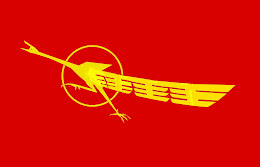





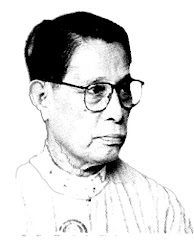


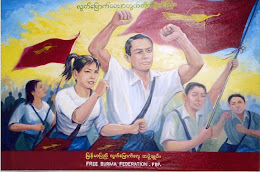





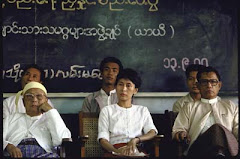

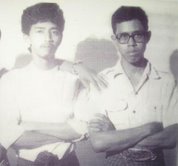

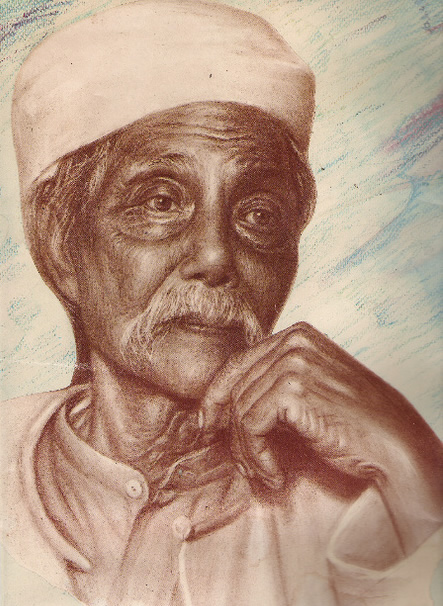
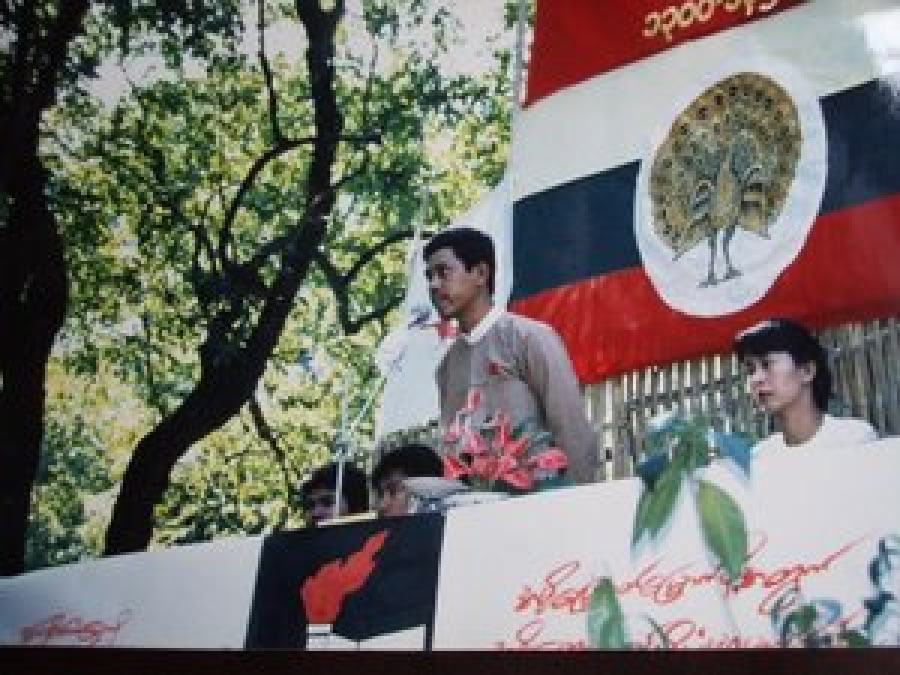
No comments :
Post a Comment